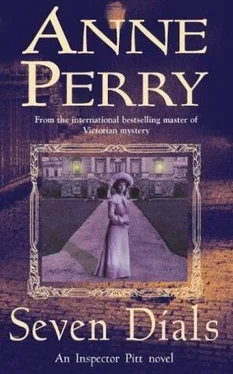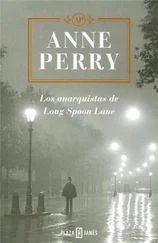Vespasia leaned a little towards him, only the slightest yielding of the stiffness of her back. “Be careful, Thomas. Saville Ryerson is a man of intelligence and deep political judgment, but above all he is a man of feeling. He has worked hard for his beliefs and for the people he represents. He has not spared his time or his means to benefit Manchester, and much of the north of England, and he has done it alone, and quite often with too little thanks.” She lifted her thin shoulders very slightly. “The Lancashire people are loyal, but they are quick-tempered and not overfond of London-made decisions. They have not always understood him. Because he is clever he has made enemies in Westminster: ambitious young men who want to topple him and take his place. Be very sure you are right before you accuse him of anything. It will ruin him, and you cannot undo that by withdrawing the charge afterwards.”
“I’m trying to save him, Aunt Vespasia!” Pitt responded fervently. “I simply don’t know how to!”
She turned away, staring at the gilt-edged mirror on the far wall, its beveled glass reflecting the leaves of the birch trees twisting and flickering in the slight wind outside.
“Perhaps you can’t,” she replied so softly he barely heard her. “He may love this Egyptian woman enough to have been complicit in her crime. Do what you have to, Thomas, but please do it as gently as you can.”
“I will,” he promised, wondering how on earth he would.
AFTER HER INDOOR DUTIES were completed, Gracie set out on her errands of the morning. It was a bright, mild day with only the slightest breeze, and she enjoyed walking, even in new boots. These were excellent ones, with black buttons, and heels that for the first time in her life made her over five feet tall.
She went briskly along Keppel Street and Store Street into the Tottenham Court Road, where she stopped at the fishmonger’s and picked out some succulent-looking kippers, nice and fat, with a rich, smoky color. She did not trust the boy who brought them around on a barrow; he tended to stretch the truth a little regarding their freshness.
She had just come out onto the pavement again and was about to turn south towards the greengrocer’s to get some plums, when she saw her friend Tilda Garvie, who was maid in a household a short distance away in Torrington Square. Tilda was a nice-looking girl, an inch or two taller than Gracie and a good deal plumper, which still left her becomingly slender. Usually she had a cheerfulness about her which made her agreeable company. However, today she walked past the flower girl without even a glance. Her face was set in lines of anxiety, and she seemed to be looking around her absentmindedly, as if not truly seeing what was there.
“Tilda!” Gracie called out.
Tilda stopped, swung to face Gracie and on recognizing her, her expression flooded with relief. She nearly bumped into a large woman with a shopping basket balanced on her hip and dragging an unwilling child with the other hand.
“Gracie!” Tilda gasped, just avoiding being mown down by the woman and not bothering to apologize for cutting across her path. “I’m so glad ter see you!”
“Wot’s the matter?” Gracie asked, moving closer to the inside of the footpath and pulling Tilda out of the way. “Yer look like yer lost summink. D’yer drop yer purse?” It was the first and most natural thought. She had done that herself and still remembered the horror of it. That was nearly six shillings gone-a week’s worth of food.
Tilda dismissed it with a shake of her head so slight it was barely a comment at all. “Can I talk to yer for a moment… please, Gracie? I’m that worried I dunno wot ter do. I was ’opin’ I’d see yer. Ter be honest, that’s why I come this way.”
Gracie’s concern was instant. All sorts of domestic possibilities flashed through her mind. The house in which Tilda worked was quite a large one, and there were several other servants. The first, most obvious troubles would be accusations of theft or one of the male staff’s making improper demands. Gracie had never feared either of those herself, but she knew very well that it could happen. Worse still, of course, was the master of the house, making demands. Refusal and acceptance were both fraught with pitfalls. To be caught, and dismissed without a character reference, was only the lightest. One could easily be with child as well! Or accused by the mistress of all manner of wrongdoing.
Simple squabbles with other maids, lost trinkets, badly done jobs, the mistress’s favorite ornament broken or dress scorched, were so simple as to be almost welcome.
“Wot’s ’appened?” she said earnestly. “ ’Ere, we’ve got time fer a cup o’ tea. There’s a place jus’ ’round the corner. Come an’ sit down an’ tell me.”
“I i’nt got money fer a cup o’ tea right now.” Tilda stood motionless on the pavement. “An’ I think as it’d choke me any’ow.”
Gracie began to appreciate that whatever troubled her, it was of a very serious order. “Can I ’elp?” she said simply. “Mrs. Pitt is ever so fair, an’ she’s clever as well.”
Tilda frowned. “Well… it were Mr. Pitt as I were thinking of… if… I mean if…” She stopped, her face white, her eyes pleading.
“It’s a crime?” Gracie said with a gulp.
Tears brimmed Tilda’s eyes. “I dunno… not yet. Leastways… Oh, please Gawd, it ain’t!”
Gracie took her by the arm and half dragged her along the pavement to be out of the way of bustling women using baskets almost like weapons. “Yer comin’ with me ter get a cup o’ tea,” she ordered. “Summink ’ot inside yer’ll ’elp. Then yer can tell me wot yer talkin’ ’bout. ’Ere… pick yer feet up or yer’ll fall flat on yer face over them cobbles, an’ that won’t ’elp no one.”
Tilda forced herself to smile and quickened her pace to keep up. In the tea shop, Gracie informed the waitress exactly what they wanted, freezing the girl’s complaints that it was too early, and sent her scurrying away to do as she was told.
“Now,” she said when they were alone. “So wot’s the matter then?”
“It’s Martin,” Tilda said huskily. “Me brother,” she added before Gracie could misunderstand. “ ’E’s gone. ’E just in’t there, an’ ’e ’adn’t told me nothin’. An’ ’e wouldn’t do that, ’cos me an’ ’im is all we got. Our ma an’ pa died wi’ the cholera when I were six an’ Martin were eight. We always looked out for each other. There in’t no way as ’e’d go orff an’ not tell me.” She blinked rapidly, trying to control the tears, and failing. They slid more and more rapidly down the curve of her cheek, and without thinking she wiped them away with her cuff.
Gracie attempted to be practical and force herself to think clearly. “When did yer see ’im last, Tilda?”
“Three days ago,” Tilda answered. “It were me day orff, an’ ’is too. We ’ad ’ot pies from the man on the corner, an’ walked in the park. The band were playin’. ’E said as ’e were goin’ up Seven Dials. Only up an’ back, like, not ter stay there!”
The waitress returned with a pot of tea and two hot scones. She glanced at Tilda’s tearstained face and seemed about to say something, then changed her mind. Gracie thanked her and paid for the tea, leaving a couple of pennies for her trouble. Then she poured out both cups and waited until Tilda had sipped hers and taken a bite out of the buttered scone. She tried to collect her thoughts, and behave as she thought Pitt would have.
“ ’Oo did yer speak to where ’e works?” she asked. “Where is it, anyway?”
“For Mr. Garrick,” Tilda replied, putting the scone down. “Torrington Square, just off Gordon Square, it is. Not far.”
Читать дальше












